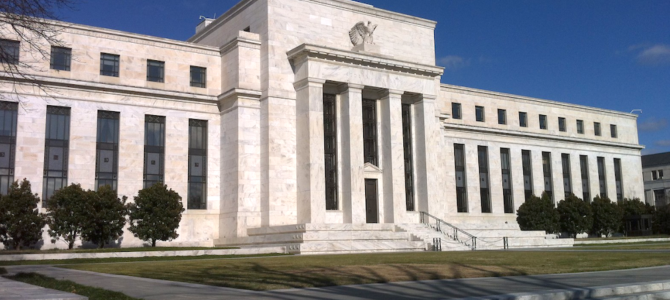
Conservatives are taking on woke capital, calling it out directly for its effort to infuse leftist principles into investment decisions affecting the health and well-being of the U.S. economy and the livelihoods of millions of Americans who make it run.
On April 15, 79 people, including former members of Congress, senior administration officials, leaders in business and finance, representatives of conservative organizations, and the founder of Green Peace, signed a letter calling on the leader of this movement, BlackRock chief executive officer Larry Fink, to reconsider his position.
The letter is the product of the Back to Neutral Coalition, a new group led by Justin Danhof, Bill Meierling, Steve Soukup, and others, which seeks to counter the left’s weaponization of American business. It comes amid the Federal Reserve’s selection of BlackRock to execute financial market transactions on the Fed’s behalf, and advise the Fed on its open market operations, spurred by the COVID-19 stresses on the economy. Federal Reserve Chairman Jerome Powell was copied on the letter.
BlackRock counts $7 trillion in assets under management, making it the world’s largest investment manager. Fink has sought to use BlackRock’s power to promote concepts including “stakeholder capitalism” and “ESG” — environmental, social, and governance-based investing, which has exploded over the last 15 years.
BlackRock Should Work for Shareholders, not SJWs
Per the Business Roundtable’s new “Principles of Corporate Governance,”signed onto by 181 major businesses including BlackRock, stakeholder capitalism is dedicated to reorienting business principles away from “shareholder primacy,” and toward “all stakeholders,” in part by “protect[ing] the environment by embracing sustainable practices across our businesses.”
The drafters of the letter to Fink contend, “By opting to enter into a public market, BlackRock received the benefit of outside investment funds with which to operate and grow. However, the bargain of that benefit is that you must act in good faith and with a fiduciary responsibility to maximize returns for those investors” — that is, not for social justice warriors (emphasis added).
They add: “This economic crisis makes it more important than ever that companies like BlackRock focus on helping our nation’s economy recover. BlackRock and others must not add additional hurdles to recovery by supporting unnecessary and harmful environmental, social, and governance (ESG) shareholder proposals.”
With respect to ESG, BlackRock recently committed to a slew of environmentalist initiatives that will affect its business. Its efforts include not only increasing ESG investment offerings, but booting companies in the thermal coal production business from the portfolios into which its clients can invest, and pressuring the firms its clients back to adhere to “UN Sustainable Development Goals, such as Gender Equality and Affordable and Clean Energy.”
In response, the signatories to the Fink letter say:
In light of your influence, we are especially concerned that your support for some ESG shareholder proposals and investor initiatives brings political interests into decisions that should be guided by shareholder interests. Shareholders and society at large benefit when companies are guided by values such as producing quality products and services, having integrity in dealing with customers and vendors, and developing the talents and skills of employees. But when a company’s values become politicized, the interests of the diverse group of shareholders and customers are overshadowed by the narrow interests of activist groups pushing a political agenda.
The letter goes on to say that activist groups — such as “environmental nonprofits, labor unions, left-leaning pension funds, [and] ESG-focused asset managers” — sponsor the majority of ESG shareholder proposals, meaning their political aims diverge from corporate shareholder interests. It continues:
Furthermore, these ESG proposals will add an extra-regulatory cost on these companies requiring them to spend their shareholder capital. This may harm everyday Americans who are invested in these companies through pension funds and retirement plans. While this won’t affect folks in your income bracket, this may be the difference between affording medication, being able to retire, or supporting a family member’s education for many Americans.
It bears noting that while claiming fealty to leftist principles, BlackRock has been expanding its China investment offerings, mirroring the move by other major index providers to increase their weightings toward Chinese companies. BlackRock is also one of two asset managers responsible for managing the Federal Retirement Thrift Investment Board’s nearly $600 billion Thrift Savings Plan, which is slated to increasingly channel the savings of federal employees into CCP-backed firms, including those that develop weapons used to threaten the life and limb of our servicemen.
This flow of funds into China from U.S. capital markets strengthens the economy that underpins the Chinese Communist Party (CCP), permitting China to persist as the world’s largest polluter.
Americans Are Unknowingly Backing Woke Capital
Setting aside the cognitive dissonance on “environmental justice,” untold millions of people — through large asset managers like BlackRock and the ESG vehicles they offer — have become unwitting backers of companies like Hikvision, the cameras of which are used to surveil Uighur Muslims in China’s gulags. This is to say nothing of Americans’ investments in the big tech companies that continue to partner with the CCP.
You may well be participating in BlackRock’s campaign, through owning shares of its iShares exchange-traded funds, or a company retirement plan managed by BlackRock. Regardless, BlackRock’s politicization affects nearly everyone, given its reach into stocks, bonds, and other instruments covering the entire global marketplace that make up its $7 trillion in managed assets.
The letter concludes that it is imperative, particularly during these times, to divorce politics from markets:
At this moment especially, all of us — including BlackRock — must be focused on the nation’s economic recovery. Investors, many of whom are terrified that their retirement funds have been lost or are at risk, need to be assured that managers of their assets are focused on those facets of business performance that are likely to produce a sustained return on investment and a return to financial normalcy. Extraneous political considerations serve only to sow confusion and exacerbate instability, when instability can least be tolerated. In unsettled environments such as this, true ‘sustainability’ is demonstrated by robustness and resilience, not by highly politicized trends and fads.
This effort is particularly notable given the extent to which leftists have sought to impose their views on Americans through corporations. A conservative counterweight dedicated to pushing politics out of boardrooms is more than needed.
Readers can view the full statement here.









